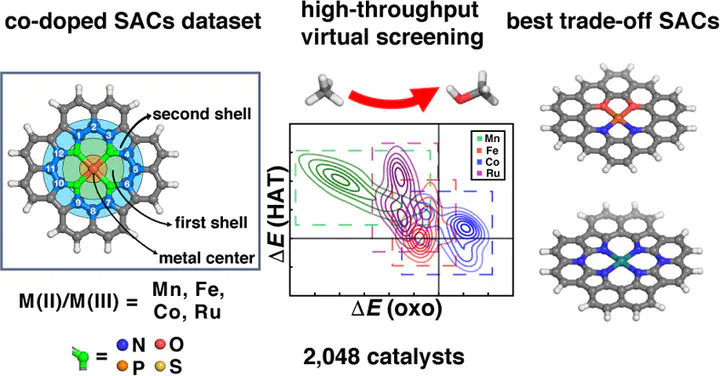Computational Discovery of Codoped Single-Atom Catalysts for Methane-to-Methanol Conversion

Abstract
The absence of a synthetic catalyst that can selectively oxidize methane to methanol motivates extensive study of single-site catalysts that possess a high degree of tunability in their coordination environments and share similarities with natural enzymes that can catalyze this reaction. Single-atom catalysts (SACs), in particular doped graphitic SACs, have emerged as a promising family of materials due to their high atom economy and scalability, but SACs are yet to be exhaustively screened for methane-to-methanol conversion. Modulating the coordination environment near single metal sites by means of codopants, we carry out a large-scale high-throughput virtual screen of 2048 transition metal (i.e., Mn, Fe, Co, and Ru) SACs codoped with various elements (i.e., N, O, P, and S) in numerous spin and oxidation (i.e., M(II)/M(III)) states for the challenging conversion of methane to methanol. We identify that the ground-state preference is metal- and oxidation-state-dependent. We observe a weak negative correlation between the oxo formation energy (ΔE(oxo)) and the energy of hydrogen atom transfer (ΔE(HAT)), thanks to the high variability in the coordination environment. Therefore, codoped SACs demonstrate flexible tunability that disrupts linear free energy relationships in a manner similar to that of homogeneous catalysts without losing the scalability of heterogeneous catalysts. We identify energetically favorable catalyst candidates along the Pareto frontier of ΔE(oxo) and ΔE(HAT). Further kinetic analysis reveals an intermediate-spin Fe(II) SAC and a low-spin Ru(II) SAC as promising candidates that merit further experimental exploration.